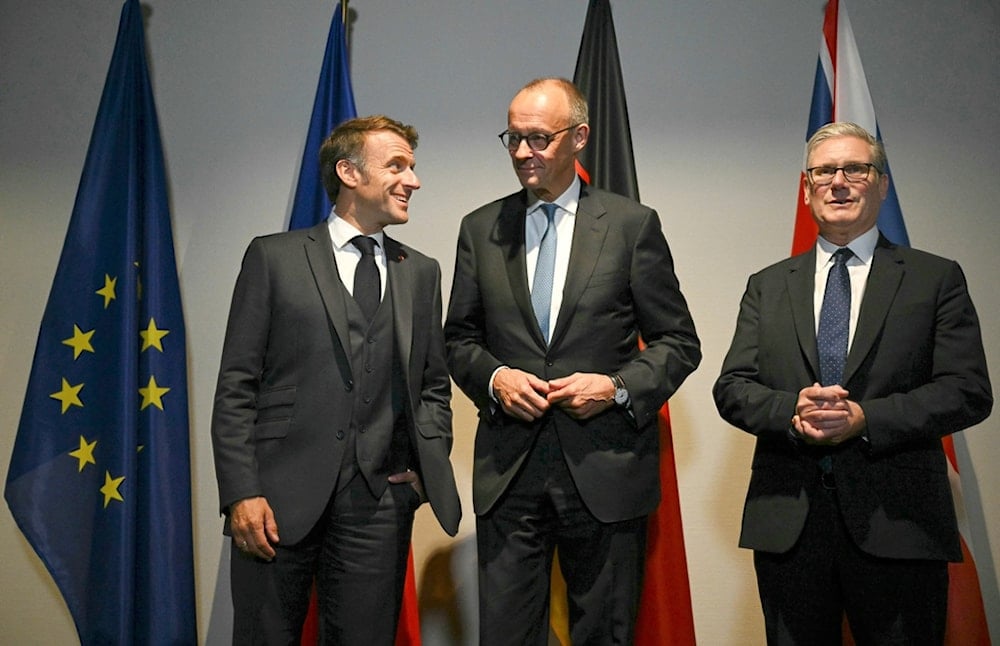E3 to launch UN sanctions process on Iran Thursday: Reuters
The United Kingdom, France, and Germany are preparing to trigger the UN snapback sanctions process on Iran this week while leaving room for diplomacy if Tehran resumes cooperation.
-

From left, France's President Emmanuel Macron, Germany's Chancellor Friedrich Merz and Britain's Prime Minister Keir Starmer pose as they meet on the sidelines of the two-day NATO's Heads of State and Government summit in The Hague, Tuesday, June 24, 2025 (AP)
The United Kingdom, France, and Germany were preparing to trigger the reimposition of United Nations sanctions on Iran, Reuters reported on Wednesday.
The three European states, known as the E3, met with Iranian officials on Tuesday in what was billed as a last chance to salvage engagement before their authority to invoke the 2015 nuclear deal's snapback clause expires in mid-October. Although European diplomats claimed the talks did not produce "sufficiently tangible commitments," Tehran has reiterated that it remains open to serious negotiations, provided its sovereign rights are respected and external threats, particularly military aggression, are taken off the table.
Coercive Measures
Despite Iran's consistent denial of pursuing nuclear weapons, the E3 are moving to initiate punitive measures, possibly as early as Thursday. These sanctions would once again target Iran's vital financial, energy, banking, and defense sectors, further burdening the country's economy. As one Western diplomat admitted, "The real negotiations will start once the letter (to the UN Security Council) is submitted."
Berlin has confirmed the option was under review, while London and Paris have remained silent. Tehran, for its part, has made clear that a "harsh response" would follow if sanctions are imposed, reflecting its determination not to submit to unilateral pressure.
Nuclear diplomacy
The move coincides with the return of UN inspectors to Iran after cooperation was suspended in June in response to Israeli and US attacks on Iranian nuclear facilities. IAEA Director General Rafael Grossi confirmed that inspectors were back but admitted there was no agreement on the scope of their activities. Iranian Foreign Minister Abbas Araghchi told parliament that Tehran had not yet reached a full arrangement with the watchdog, signaling Iran's insistence on terms that respect its sovereignty.
European diplomats have suggested they might postpone the snapback for up to six months if Iran allows unrestricted inspections and engages with Washington. However, Iranian officials maintain that dialogue with the United States can only resume if Washington guarantees it will refrain from military strikes during talks. President Masoud Pezeshkian has described such engagement as pragmatic, not capitulation, while parliamentarians and hard-line voices insist that Iran should not be forced into concessions.
Negotiated resistance
Iran has nonetheless shown goodwill by permitting inspectors to oversee operations at the Bushehr plant, even while resisting pressure to cede full access. At the same time, Moscow and Beijing have advanced proposals at the UN Security Council to delay sanctions for six months, reflecting international recognition that Iran's approach is based on negotiation rather than escalation.
Although the IAEA notes it cannot certify the program as entirely peaceful, it has also confirmed there is no credible evidence of an organized weapons effort in the Islamic Republic. The standoff now pits Iran's demand for fair treatment under the Nuclear Non-Proliferation Treaty against Europe's resort to pressure tactics, with the future of diplomacy hanging in the balance.
Read more: Iran pushes diplomacy as Europe threatens sanctions snapback

 3 Min Read
3 Min Read








